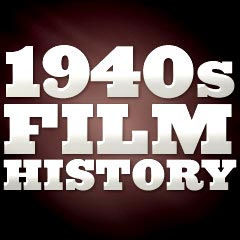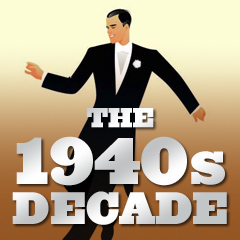 |
Part 6 Film History of the 1940s Part 1, Part 2, Part 3, Part 4, Part 5, Part 6 Film History by Decade Index | Pre-1920s | 1920s | 1930s | 1940s | 1950s | 1960s 1970s | 1980s | 1990s | 2000s | 2010s |

|
|
The Hollywood Ten and Blacklisting:
For their refusal to cooperate, the Ten were considered criminals and jailed for up to one year, and fined $1,000 for contempt of Congress. They were also unofficially 'blacklisted' by the US film industry.
Over 300 movie industry figures and blacklisted stars had their careers ruined between 1947 and 1952, when the HUAC investigation ended in the mid-1950s. Film stars and industry figures such as Myrna Loy, Orson Welles, Jules Dassin, Sterling Hayden, Zero Mostel, Gregory Peck, Katharine Hepburn, Gene Kelly, Danny Kaye, Larry Parks, Joseph Losey, Frank Sinatra, John Garfield, Paul Muni, Sylvia Sydney, Anne Revere, Arthur Miller, Howard Da Silva, Robert Rossen, Lionel Stander, Fredric March, Edward G. Robinson, Judy Holliday, Jose Ferrer, Charlie Chapin, and Melvyn Douglas were either:
In 1957, Robert Rich (later discovered as a pseudonym for blacklisted screenwriter Dalton Trumbo) won the Best Original Screenplay Academy Award for The Brave One (1956) - under his real name, Trumbo was officially presented with the award in 1975. Blacklisted industry members were not eligible for Oscar nominations until 1959. And it wasn't until 1960 that Dalton Trumbo (one of the original "Hollywood Ten" who was declared an "unfriendly witness", jailed for "contempt of Congress," and forced to use a pseudonym after being released from jail) was openly hired by executive producer Kirk Douglas to script and receive screenwriter credits for writing the screenplay for Kubrick's film Spartacus (1960). Otto Preminger also gave Trumbo a chance to adapt Leon Uris' novel for the film Exodus (1960) and to receive proper credit as screenwriter. The End of the Decade, and the Beginning of the End of the Studio System: At the end of this decade, reeling from depression, war, problems of the return to peacetime, and the ominous arrival of the atomic bomb, the world was a more cynical, chaotic, economically-unsure and film-noirish place. Studios were also forced to re-evaluate their roles and approaches, with lawsuits that stripped the studios of their lucrative practices. By the late 1940s, the motion picture industry surely faced its period of greatest crisis and challenge, with the depressing bleakness of the Cold War on the horizon. Hollywood suddenly found itself with many threatening forces at the close of the 40s and the start of the next decade:
Block-booking of films was declared illegal and studios were forced to divest themselves of their studio-owned theatre chains by the Paramount Decrees (an action of the US Justice Department and an anti-monopoly decision of the US Supreme Court in 1948 against the Big Five major film studios and three minor studios). The court's anti-trust decision in U.S. vs. Paramount mandated that the production and exhibition functions of the film industry had to be separated. Now that the studios would have to achieve box-office success based not on their marketplace strength but on the quality of their films - now sold by a film-by-film and theater-by-theater basis - the stability of the studio system of marketing was severely threatened and began to crumble. Studios would be gradually reduced to production and distribution organizations, forced to give up or divest themselves of their vast theater holdings, and prohibited from 'block booking', fixing admission prices, and forcing their lesser products onto independent exhibitors. They were pressured to usher in an era of competition, free agent stars and auteur directors, and many of them were forced to begin selling film rights to pre-1948 films to television to bolster profits.
Part 1, Part 2, Part 3, Part 4, Part 5, Part 6 |